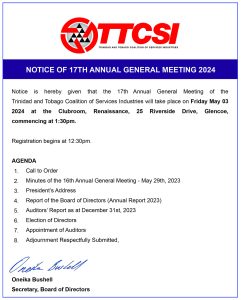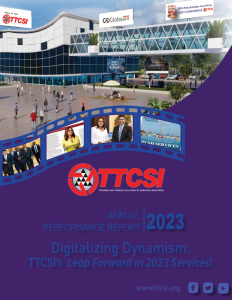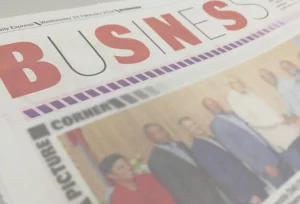I am indeed honoured by your invitation to share some perspectives on the way forward with our trade policy as it relates to our foreign policy. In order to do this, I have to draw upon all my resources and past experiences in order to establish that these policies are not incompatible but indeed enjoy a great measure of congruity.
Hence, I feel assured that previous diplomatic and Ministerial portfolios that were entrusted to me and my sojourn in the private sector have afforded some valuable insights on the essential but equally complex issues of foreign policy, trade policy and investment promotion in our current global context. I am confident that working together we could significantly advance our positions and bring lasting and incalculable benefits to Trinidad and Tobago.
I come to my current responsibilities with firm knowledge that in less than a decade the world in which we do business is very different and could have become infinitely more challenging.
Some parameters do not change at all and while Trinidad and Tobago could be proud about its relatively strong energy based economy with well developed secondary manufacturing and service sectors, Trinidad and Tobago is still a small developing country with vulnerabilities. This means that we are obliged to conduct our international affairs with certain efficiencies in knowledge and technology that seek to level the playing field, while structural inequities persist.
It is for this reason I must commend the Coalition of Services Industries for having the foresight to recognize the need to organize our service companies and service providers in such ways that would afford them the capacity to better exploit the several opportunities for marketing, trade and investment in our region, and in the wider international arena.
The service sector is the biggest employer of labour in Trinidad and Tobago and so your success is Trinidad and Tobago’s success. The tremendous growth of trade in services and more recently of electronic commerce is also part of the new trade paradigm. Enhanced international competition in trade in services means reduction in price and improvement in quality that would improve the competitiveness of down-stream industries. Underpinning this surge in the trade in goods and services is the growing commitment developing countries have shown to liberalizing their trade regimes.
The establishment of the Office of the Special Ambassador for Trade and Industry is expected to lend strategic advantage to our diplomacy and our investment and trade promotion. With it comes the recognition that international trade and trade policy deserve special dedicated attention if they are to become effective for small countries such as Trinidad and Tobago.
The location of the Special Ambassador for Trade and Industry within the Ministry of Foreign Affairs also recognizes an inescapable nexus or coherence between trade policy and foreign policy, which we would do well to identify and to utilize to our fullest advantage.
But are we inventing the wheel on this occasion? Certainly not in the case of Trinidad and Tobago. I recall that during latter part of the 1980’s there was a Ministry of External Affairs and International Trade and more recently, in 2001, I held the portfolio of Minister of Enterprise Development Foreign Affairs and Trade, which was a merger of the portfolios of Business Development, Trade, Foreign Affairs and other government departments.
I have also been reliably informed that in response to the current pace of globalization, which has brought to the center stage a very diverse mix of state and non-state actors within very sophisticated and speedier systems of communications technology, virtually every diplomatic service in the world is in the process of retooling to ensure that they become more effective in trade, investment promotion and business facilitation.
The British are doing it, the Canadians have been doing it for years, and as more countries appear on the high profile international stage, both big and small, they are all expected to engage on all possible fronts for their mutual benefit.
It is not that such duties were never attended to before in diplomatic missions, as every diplomatic officer that has been posted to a foreign country knows very well, but today’s complexities and uncertainties have imposed new demands on expertise and specialization.
I might dwell on some of these complexities, certainly from Trinidad and Tobago’s perspective.
After a decade of difficult negotiations with several stops and starts and numerous breakdowns, the establishment of a rules based international trading system with the World Trade Organization at the center is far from reality. Protectionism, including protectionism in the rich and powerful markets of the world, is still the order of the day.
The collapse of the international financial system beginning with the melt-downs occurring in the United States that spread to the rest of the developed world has led to significant economic contraction in the markets of the richer countries. While Trinidad and Tobago and most of Latin America managed to avoid the worst effects of this financial crisis, some challenges have been encountered.
Recent statistics indicate that the developing countries’ share of world production and trade has increased significantly leading to some shifting in the global balance of economic and political forces.
The G-20, which includes countries as diverse as the US, Canada, South Korea, Turkey, India, South Africa and Brazil, could be replacing the more restrictive G-7 as the most powerful negotiating bloc in international affairs. With 19 independent states in the G-20 the European Union is counted as the 20th “state”.
South-South cooperation has taken on an added dimension and we have seen the emergence of countries such as Brazil, India, China and Australia as donor countries making contributions to development projects in Africa, Asia and the Caribbean. Trinidad and Tobago has also joined the list of countries making contributions and our offer of development assistance in the field of Energy to the countries of Africa has met with very favourable response.
The process of regional integration continues apace. After more than four decades of working on CARICOM, Andean Integration, MERCOSUR in the Southern Cone, SICA in Central America, the Association of Caribbean States, etc., we are now witnessing the emergence of yet another configuration, the Community of Latin American and Caribbean States, which was heralded by Latin American and Caribbean Leaders assembled in Mexico, last February. This new grouping deliberately excludes the US and Canada, while including all other member states of the Organization of American States and Cuba. All CARICOM states have signaled their participation in the new regional grouping.
China has emerged to become the second largest economy in the world with a very active diplomatic and economic presence in the Caribbean and the other regions of the developing South. For some Latin American countries, China has become their largest export market. At the moment there is considerable political pressure being brought to bear on China to revalue its currency upwards with some developed countries including powerful sectors in the United States accusing China of intervening in the currency markets to keep its value low and to keep its exports attractive to world-wide consumers. This is a clear indication of the economic strength of China and the force of Chinese diplomacy in today’s world
The global financial collapse did not affect financial systems and their stakeholders alone. Recent events in Greece, France, Spain and Belgium suggest that government institutions in these countries were also badly affected to the point that they are unable to deliver on their promises to public sector employees and the sectors that depend on them. Markets in the developed world have contracted and there is evidence of potential investors looking increasingly towards the emerging countries for their opportunities.
Another very potent and constraining reality comes from the fact that transnational criminal and terrorist networks have ensured that virtually every transaction conducted anywhere in the world has to be brought within criteria and controls established by national and international security concerns. Our financial systems have to be subjected to systems of oversight designed to prevent drug trafficking and money laundering, financing of terrorist activities and financing of the illegal trade in arms and human trafficking. It is the very financial systems that we expect to respond to our business and commercial needs and today’s businessperson is required to become adept at utilizing these systems and to meet the criteria
The new scenarios suggest that countries such as Trinidad and Tobago might be forced to compete with the bigger countries and their large investors for the same markets for our goods services and expertise, within very complex rules of engagement. Keep in mind that some of the bigger global investors command resources that are infinitely larger than the combined Gross Domestic Products of the developing countries.
I am proposing that given today’s scenarios, Trinidad and Tobago’s trade policy and our foreign policy must converge and synergize in such ways that would allow us to engage concurrently at the required political, social and commercial level, in order to derive real and sustainable benefits from our several initiatives
I have taken the liberty of highlighting the problems and some of the criteria for success. The critical task, however, is to find viable solutions and to implement them. What has to be done in the short to medium term to bring about the convergence between foreign policy and trade policy?
The Ministry of Foreign Affairs is the only Ministry that is required to maintain a permanent diplomatic presence in selected countries. Our diplomats staff these Missions and they are expected to develop useful contacts and channels of communication with their hosts and provide political and economic reports to Headquarters. Diplomats are also potential focal points for trade and business facilitation and any other priority that may be set by the national community they represent.
In the multilateral fora, diplomats are engaged in the very time-consuming tasks of aligning Trinidad and Tobago’s interests within the global currents that deal specifically with inter-state relations and politics, the activities of major international organizations, international legal issues, global disarmament and conflict resolution, nuclear non-proliferation, climate change and human rights, to mention but a few.
Trinidad and Tobago, like any other sovereign nation state has to balance its domestic interests with its international commitments and foreign policy, more often than not, is an extension of domestic policy.
The question arises – How could foreign policy with all its myriad concerns serve the demands established by trade policy? At first glance, trade policy appears to be rooted in the practical, seeking solutions that would facilitate the national and international movement of goods and services under defined conditions. On the other hand, to the un-initiated, foreign policy appears to be more superficial and concentrated only on the intangibles. Of course the reality is quite different to what appears at first glance.
Who would doubt that badly conducted negotiations on the part of one state in a border dispute between two adjacent states and involving vast reserves of natural resources that are vital to both states, could have dire economic consequences for the poor negotiator. The scenario is clearer when the resources lie close to or even straddle legally established boundaries. In such cases the implementation of foreign policy has to be effective or else, as we say in Trinidad and Tobago, “crapaud smoke yuh pipe”.
The decision whether or not to establish a permanent diplomatic presence in a given country could be driven more by the prospects for increased trade and investment and not only the long-standing historical or political ties that may exist between two countries.
Where then, if at all, do the twain – foreign policy and trade policy meet and how could such convergence be managed successfully on both fronts?
I would suggest that a useful starting point for countries such as Trinidad and Tobago could be based on our local private sector, whether in energy, manufacturing or services, building their horizons for success well beyond the boundaries of Trinidad and Tobago. This process has already started and we are pleased to note the number of Trinidad and Tobago manufacturing and service companies and Trinidad and Tobago experts in the energy sector who have ventured far afield and have established themselves in foreign locations.
If I read the mandates of the Coalition of Services Industries properly, and I think that I have done so, then I should anticipate the Coalition consolidating its position in the Caribbean and in Latin America and moving ahead to establish a global presence in the not too distant future.
Once our economic agents begin to think and act globally then our national interests, our foreign policy and our diplomatic engagements derive better focus.
At the same time our investment promotion and our business facilitation become more effective to the point where all of our institutions and not only the Ministries of Foreign Affairs and Trade, are engaged in the business of attracting viable opportunities to Trinidad and Tobago.
This is not the end of the picture. Fierce challenges are the order of the day in our global village, and I have highlighted some of these challenges. After some years in the field, I have come to the conclusion that effective engagement in the global arena, notwithstanding all of the risks involved, is the most viable way forward for developing countries such as ours. Effective global engagement might be seen as an imperative for national success.
This is when foreign policy and trade policy converge. This is what we have been doing and we have the capacity to continue in this vein.





